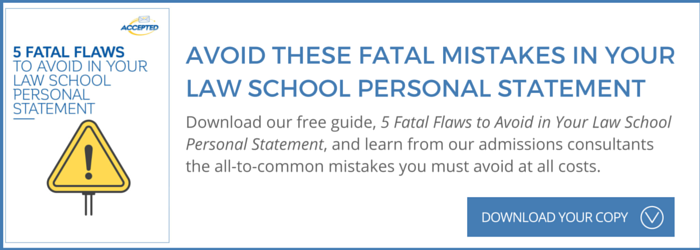
Applying to law school is a long, costly process. Every applicant believes that the schools they are applying to are the correct fit for them, and then are devastated if and when they receive rejection letters in place of the acceptance letters they were expecting. Unfortunately, many applicants make several critical errors during the application process, including minimizing the importance of their LSAT scores and GPA as well as ignoring overall acceptance rates.
How You Can Avoid the Law School Admissions Errors that Trip Up So Many Applicants
Don’t you wish you had all of the information in one place to help you apply to law school realistically and effectively? That information is now available to you. Accepted’s 2018 Law School Selectivity Index is now online. The Index is based on the most recent U.S. News ranking data. It includes the following information:
• Average GPA: Yale has the highest GPA at 3.91. The next highest GPAs are #2-ranked Stanford with a 3.90 GPA and University of Chicago, also with a 3.90. The average GPA of the top 10 schools is 3.843.
• LSAT scores: The highest median LSAT score is 173, at Yale (ranked #1) and Harvard (ranked #3), followed by #2 ranked Stanford, with 171. The average LSAT of the top 10 schools is 170.
• Acceptance rates: Yale has the lowest acceptance rate at 8.4%. The average acceptance rate at the top 10 schools is 18.36%.
Not surprisingly, Yale is ranked #1 in the Selectivity Index with the highest average GPA and LSAT scores, and the lowest acceptance rate. Yale’s 100 on the Selectivity Index are followed by Stanford (97) and Harvard (91).
The Law School Selectivity Index helps you determine, based on these data, how realistic a chance you have of acceptance at any given school.
Although these metrics are not the only ones used to determine admission, they do reflect how difficult it is to be accepted to different law schools. They also indicate which metrics are more important to which schools.
Why the Law School Selectivity Index is Just One Tool in Your Application Toolkit
Although helpful, the Selectivity Index has several weaknesses:
• It doesn’t reflect non-qualitative information. This information plays a role in the admission process. Those applicants with strong non-qualitative attributes often allow these students to be accepted when their stats are not as strong.
• It doesn’t reflect a school’s need for diversity in their classes and community.
• It doesn’t include the importance of demonstrating fit with a specific school’s strengths, mission, and values.
Despite these weaknesses, the Selectivity Index is an important resource for your admissions process. Law schools are purposeful in how they choose whom they accept, and your numbers – your GPA and LSAT scores – are critical in determining your law school competitiveness and where you should apply.
Your application process needs to be equally thoughtful and purposeful. The Law School Selectivity Index will show you where your numbers fall and help you choose to apply to a mix of law schools – some where you are competitive, and some that will be your “safety” schools, and reaches.
This knowledge will help make your application process much less stressful and enhance the likelihood of your snagging a spot in next year’s law school class. Check out the 2018 Law School Selectivity Index here.
How an Expert Law School Admissions Advisor Can Help
The law school admissions process is long and grueling, and competition is fierce. If you want this law school application to be the one that gets you accepted, then you’ll need to be strategic and thoughtful when you choose where to apply.
This is where our expert admissions consultants step in.
When you work one-on-one with an Accepted advisor, one with decades of experience, you learn how to position yourself strategically and thoughtfully, how to use your competitive advantage to come out ahead of the thousands of other applicants. Explore our Law School Admissions Consulting services, choose the best law schools to apply to, and then submit an application that will get you ACCEPTED.

Related Resources:
• The Law School Admission Guide: 8 Tips for Success, a free guide
• 5 Tips to Write a Law School Personal Statement that Gets You In
• Help! My LSAT is Low – Should I Still Apply to Law School?
The post How Does Your Top Choice Law School Rank in Accepted’s Selectivity Index? appeared first on Accepted Admissions Blog.



No comments:
Post a Comment